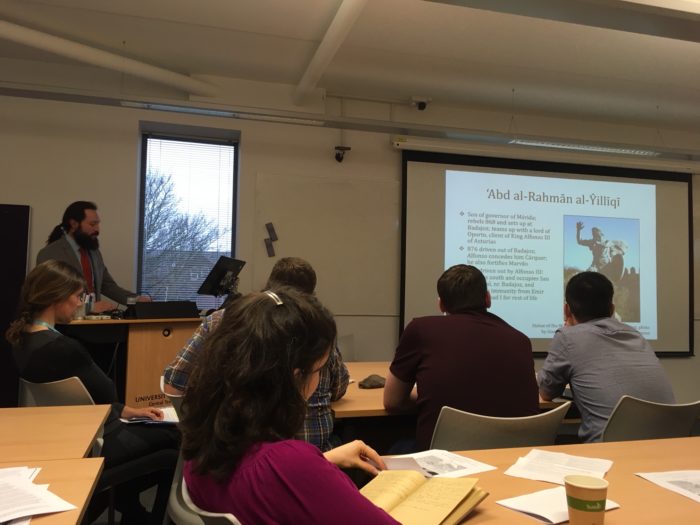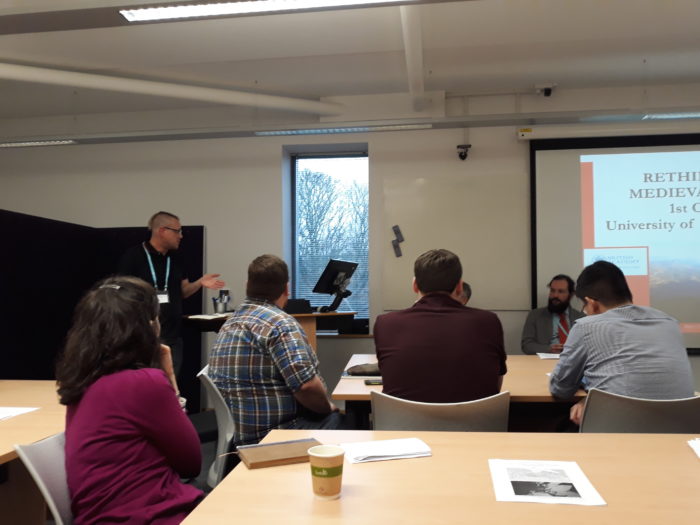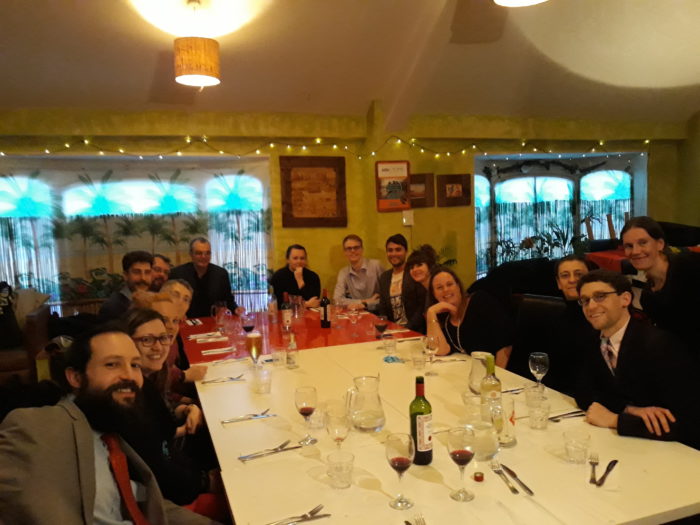Report on 1st Conference
- Tags
- Adele Curness
- Alex Metcalfe
- Anastasija Ropa
- Anna Kelley
- Casa Colombiana
- Catarina Villamariz
- Charles Insley
- conference
- Hajnalka Herold
- Hervin Fernández-Aceves
- Jonathan Jarrett
- Leeds
- Luca Zavagno
- Luciano Piffanelli
- Marco Panato
- Margault Coste
- Margriet Hoogvliet
- Norman Wetzig
- Patrick Fazioli
- Rebecca Darley
- Sam Ottewill-Soulsby
- Stephen Lewis
- theory
This report is so very overdue that the actual event seems a very long time ago now, but this second phase of the Rethinking the Medieval Frontier project would not be complete without at least some account of the conference, so at last I have sat down and written one for you all. Rejoice! Or at least, enjoy, I hope...1
Viewed in the round, I think we can safely say that the event was a success! As the organiser, I will admit that I experienced the conference most immediately as a continuous series of small problems that needed sorting out. Apparently it didn't look that way to the delegates! But in those problems I was very lucky to have the help of the MeetinLeeds team and especially the Conference Assistant for the day, Claire, who was invaluable. The catering also drew comments like "I wish we could do this at my university!" from people, which was extremely gratifying. But you probably aren't reading this to find out about food; I just want to give credit where credit is due. Overall, we had eighteen speakers, ranging from very new (but smart) postgraduates to seasoned established scholars and all steps in between, from the USA, the UK, Germany, Italy, France, Portugal, Latvia, the Netherlands and Turkey, and we had one speaker due to attend from India who sadly had to cancel. Next time! Meanwhile, the geographic range we were covering included Eastern Europe, the Sahara Desert, Arabia, modern-day Syria, Northern and Southern Italy, the Red Sea, Wales, the Pyrenees, Portugal, Livonia, Northern France, Sicily, the Low Countries, Cyprus, the Balearic Islands and Ireland, over about 1200 years with not much overlap, but quite a lot of comparability, and that of course was the point. I had organised the programme so that none of the people whose areas crossed were in the same sessions, in fact, to maximise the possibilities for people to learn from each other, and that seems to have worked. The proof will be in our written versions, of course, but on that more in a future post.
The evening before, those of us in town had met up for an informal dinner in Trinity Kitchen in Leeds, which is a good choice for such things as pretty much any cuisine people do or don't like is there in a shared restaurant space. If you have no idea what people do or don't like to eat, therefore, it is a pretty safe bet, and so it transpired this time. This also meant that several of us who otherwise wouldn't have knew each other when we reassembled the next day, and were able to check things about timings and so on with me. It was a promising start.
Then the next day, as the gathering formed up, we began with coffee and pastries in the breakroom that we had set up between the two conference rooms. Thus equipped, I the said a few words about the agenda and why I'd wanted to do this conference. This was more or less impromptu and first thing in the morning so that it was coherent at all was a relief, but the main point was one of conversation: I expressed the hope that by the end of the day, all of us would want to change our papers because of what we'd heard. I don't know if we managed that, actually, because some of the papers were good enough to withstand comparison, but I'm still hopeful.

Our location for the day, the Maurice Keyworth Building in Leeds University Business School, on the left
With that done, anyway, we started the day proper with the keynote address, by Patrick Fazioli of Mercy College, who looked at frontiers with us from an archaeologist's point of view. The range of theoretical tools he had available to deploy on his evidence, which came substantially from the early made some of us quite envious and eager to catch up, I think, though some of it was network stuff with which I am more familiar, but his suggestion that what we might be able to come up with together was a typology of frontiers is still well-placed; each discipline sort of has one already, but the overlaps and gaps would be fruitful to identify.
Then, because we had had such a quantity of good applications, I had had to break the papers into two parallel strands. What this means, of course, is that I could only see one set at once, so I sadly cannot tell you about any of these:
- Anna Kelley (University of Birmingham): "Populating the desert frontiers: the trading communities of the Saharan and Arabian Deserts"
- Norman Wetzig (Martin-Luther-University Halle Wittenberg): "Defining Space and Border of Landscapes and Minds: a multimethodological definition of early Byzantine Phoenicia"
- Marco Panato (University of Nottingham): "Rethinking the Role of Rivers as Frontiers in the Central Po Valley in a long-durée Perspective"
- Rebecca Darley (Birkbeck, University of London): "What is the Difference between a Frontier and an Edge?"
- Stephen Lewis (Université de Caen Normandie), "Was There a Specifically 'Viking' Frontier? Three Continental Cases Compared"
- Hervin Fernández-Aceves (University of Leeds): "A Border Within Borders: the Abruzzo and the kingdom of Sicily in the twelfth Century"
- Margriet Hoogvliet (University of Groningen): "Rethinking Borders and Identities in Northern France and the Southern Low Countries (c. 1350-c. 1550)"
except that I heard good things about all of them from people in the other strands. the ones I did hear, and in some cases moderated (though I hardly needed to as everyone was very careful about time-keeping, thankyou all), were these:
- Charles Insley (University of Manchester): "Beyond Offa's Dyke: Rethinking the Anglo-Welsh Frontier in the Early Middle Ages"
- Luciano Piffanelli (Università di Sapienza, Roma): Crossing Boundarioes: Rethinking the Problem of the Spheres of Influence in Late Medieval Italy. An Interdisciplinary Study"
- Margault Coste, "Living on the Frontier of 1258 between France and Aragon"
- Sam Ottewill-Soulsby, "The Wolf's Mouth: Crisis and Escalation on the Carolingian-Moravian Frontier, 882-885"
- Catarina Villamariz (Universidade Nova de Lisboa): "The Religious Frontier: Concepts, Boundaries and Specificities"
- Anastasija Ropa (Latvijas Sporta pedağogijas akadēmija): "The Permeable, Moving Frontier in Gerald of Wales's Writings and Henry of Livonia's Chronicle"
- Adele Curness (University of Oxford), "Porous Borders in Southern Italy: The Byzantine Frontier with the Islamic World Reconsidered"
I should thank the other scholars who cheerfully moderated those sessions I couldn't, by the way, they being Rebecca Darley (already mentioned), Alan Murray (University of Leeds) and Luca Zavagno (Bilkent University); thankyou all. As for the speaker, it would be invidious to single anyone out, but if one were to draw links, it was noticeable to me that many of these papers circled around the question of definitions, of whether we as scholars identify frontiers in our medieval materials in the way that our sources's writers or makers did, and if we know what that definition was, how it varied between observers and whether if ever it stayed the same. In particular, there was some focus on frontiers of the mind, on where and when people thought they had moved into another zone or space from the one where they'd started, and this of course has more than just a geopolitical conception. Then another thread might be drawn between those who were interested in how anyone controlled such spaces, real or spiritual, with the corollary that such attempts might be unsuccessful and even disastrous (not least because of the complexity of the situations), or might work but only over a very long period, longer than most governments would last, or of course be contested by plural competing or just opposed interests in the zone, which circumstances would then change the nature of the frontier in question. There's much to do here to achieve the typology that Patrick had suggested we need, but perceptions of the inhabitants, perceptions of outsiders, and actions of interest groups will be factors in any typology we do produce, I'd suggest.

Yours truly (Jonathan Jarrett) presenting his paper in the final session. Photograph by Patrick Fazioli
The final session of the conference was dedicated to the work of the members of the actual Network, in which we got to try and put our money where our mouths were, as the almost-inexplicable saying goes. 'We' for these purposes were:
- Luca Zavagno (as mentioned): "'Going to the Extremes': Cyprus and the Balearics as Byzantine Mediterranean Thresholds between Late Antiquity and the Early Middle Ages (ca. 600-ca. 800)"
- Hajnalka Herold (University of Exeter): "Frontiers in Post-Roman and Early Medieval Central Europe: An Archaeological Perspective"
- Jonathan Jarrett (University of Leeds): "Our Man on the March: Three Frontier Lords and their Geographical Positions"
Again, it would be impolite of me to try to make judgements of my friends' and collaborators' scholarship here, except to say that I thought they delivered very well on the promise of the Network for putting different perspectives together. as for my paper, I perhaps unwisely offered comparisons from three areas in which I'm not really too expert, the Middle Byzantine Caucasus, Umayyad-era Badajoz and the northern Irish Sea in the time of St Columba, the last going back to research I did twenty years ago now (argh) and the second going back only to teaching I'd done the previous year, but it seemed to get people thinking nonetheless, and in fact what had been supposed to be our discussion session melded seamlessly into the final question-and-answer session, which Network member Alex Metcalfe thus wound up chairing whether he liked it or not! Sorry, Alex...

Alex Metcalfe ably chairing the discussion after the final panel; photograph by Catarina Villamariz
Anyway, all was wrapped up more or less satisfactorily (and nothing more need be said about any loudspeakers), and we then got taxis down to the Grand Arcade in Leeds where dinner at Casa Colombiana had been booked. This was, as it always has been when I've been there, a delight, and the least I can do for the excellent time we had and service we received is recommend them very highly. There can be nowhere better to consider the great meeting of cultures that is dining together in a cosmopolitan British city! It was a successful end to what I have to admit, having now written it up, feels like a pretty successful conference!

The company assembled at Casa Colombiana, photograph by Catarina Villamariz (who is therefore not shown)
1. I should say that if you don't like this write-up of the conference, others are available! I recommend this one by University of Leeds Institute for Medieval Studies intern Victoria Yuksaitis, which has some quotes from participants other than myself...

